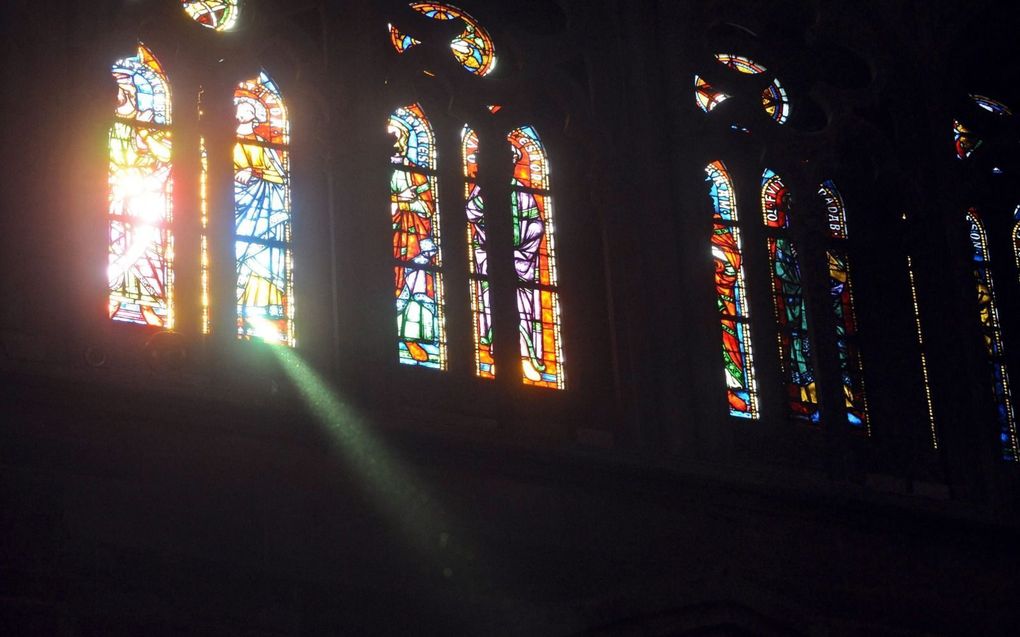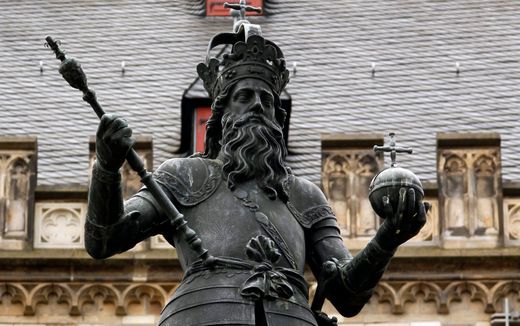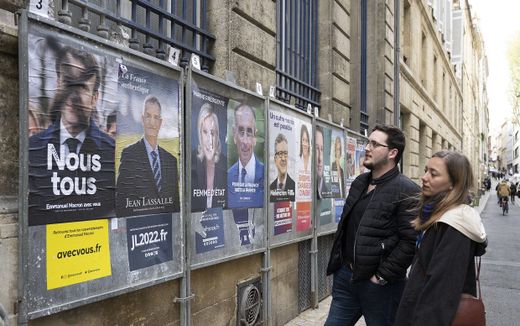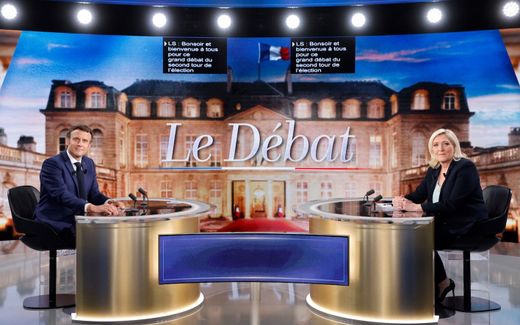Farewell to Christian culture without nostalgia
27-04-2022
European Union
Mark Wallet, RD

Strasbourg Cathedral. Photo AFP, Patrick Hertzog
European Union
The era of Christian dominance in European culture is definitively over, says Chantal Delsol, a French emeritus professor of philosophy. As a believer, she is not necessarily sad about this. "The church will become small and marginal. However, that helps to set the right priorities."
Chantal Delsol lives a stone's throw from Saint Sulpice, one of the largest churches in Paris. The seventeenth-century house of worship is almost 120 metres long and widens over 57 metres with a majestic façade crowned with two towers. Everything exudes a time when the church occupied a central place in society.
Those days are over. In the shadow of the Saint Sulpice, Delsol wrote the booklet "La Fin de la Chrétienté" ("The End of Christendom", Les éditions du Cerf, 2021). In it, she argues that Christianity (in French: christianisme) may not have disappeared from France and Europe, but a culture soaked in Christianity has.
Dominant faith
According to the philosopher, an era of sixteen centuries has thus come to an end. Delsol places the beginning of European Christian culture in 394, at the battle of the Frigidus, a river in present-day Slovenia. The Christian emperor of the Eastern Roman Empire, Theodosius, defeated his pagan counterpart of the Western Roman Empire, Eugenius. That victory established Christianity in Europe as the dominant faith – Christians at that time were called "modern." The end of the Christian culture in Europe came in the second half of the twentieth century with the passage of legislation that cleared the way for things as divorce and abortion.
The signs of the end had long been visible by then. In her book, Delsol approvingly quotes the French poet and essayist Charles Péguy, who wrote at the beginning of the twentieth century that "the world has changed less since the time of Jesus Christ than in the last thirty years. There was the antique (and biblical) era. There was the Christian era. There is the modern era." The question now remains: what exactly does that mean?
In your opinion, when is there a Christian culture? What are its characteristics?
"It is a civilisation in which all areas of life are in harmony. Think about morality, religion, politics and economics, et cetera. For example, in Christian civilisation, democracy is modelled on an image of God giving man freedom. It has its roots in the sixth century in the Benedictine monasteries. For almost two millennia, Christian beliefs shaped our morality, our laws, our policies, our economy, and everything else.
All that is not gone. A culture does not just disappear. Values such as evangelical compassion now translate into humanism; however, other branches of the tree have been cut off, such as the idea of transcendence and the intrinsic dignity of human beings. It is now a kind of a mix."
You describe Christian culture as the fruit of Catholicism in your book. How do you characterise the culture of predominantly Protestant countries?
"Christian culture is, first of all, a fruit of Catholicism because, in the first centuries, there simply was no Protestantism. In addition, Protestantism does not have a rigid ecclesiastical framework, whereas the church has a central role in maintaining such a civilisation.

Protestantism adapts more easily. Therefore, traditional Protestant countries have made the transition to modernity much more smoothly than Catholic countries. The Roman Catholic Church only embraced the principle of freedom of conscience with the Second Vatican Council, but by then it was too late."
Is a strong church, like the Roman Catholic one, necessary to form a Christian culture? Doesn't that also happen automatically because churches form members intrinsically, including the Protestant one?
"Of course, the church does not have to be powerful to exist and exert its influence. Christians believe that the church is eternal, but it may be very limited in size in particular centuries. But the church will remain and shape people. However, there will be no broad-based Christian culture.
Protestantism is very malleable in relation to the world. It can fully adapt to the times – that is what Catholicism blames Protestantism for. Therefore, it can stand its ground more easily, but the danger of that adaptation is that the message will be so diluted that some will wonder what is left of it."
You write that the spirit of revolution began to blow during the Dutch Revolt in the sixteenth century. Christian values were not at issue then, but the notion that the same ideas could be imposed on the whole of society was. Can you say that the principle of freedom of conscience inevitably leads to secularisation?
"I think it does, left or right. But it is inevitable. A society is always made up of different people and communities. With freedom of conscience, we recognise that not everyone needs to think in the same way.
A secular society, by the way, does not mean that there are no religious people anymore, but that those who believe in God and those who don not, can live together reasonably.
According to you, our society is partly returning to the pre-Christian pagan culture. Can you explain that?
"The polytheistic or pagan culture could be characterised as a primitive or instinctive form of religion. It develops naturally because people ask themselves questions about the meaning of life and death. On the other hand, monotheistic religions are very complex – and, therefore, more difficult to pass on and keep alive. If monotheism disappears, it will inevitably be replaced by polytheism, pantheism (the idea that everything and everyone is divine, MW) or paganism: for we continue to ask the big questions of life. The German sociologist Max Weber wrote that the pagan gods had nestled in the shadows of monotheism, ready to reappear as soon as it cracked. Paganism is an instinct, a kind of primal soup into which we fall as soon as nothing else is available.
You describe in your book frantic attempts to save Christian culture from the end of the 19th century to the 21st century. Did they slow the fall somewhat?
"Certainly. They were courageous attempts, even made with flair. In the end, attempts were made to reconcile Christianity with modernity, but without success. In the second half of the twentieth century, during the Second Vatican Council, the church recognised what had been thought through in society for two centuries. Everything has been done to slow down the decline, which I elaborate on in my book, for example, around the divorce laws. However, it is impossible to prevent societies from evolving."
What does that mean for specific Christian parties, as we know them in the Netherlands, for example? Are they fighting a losing battle?
"Christian political parties can try to curb the excesses of some laws, sometimes with arguments that are not specifically Christian. Take the bizarre excesses of so-called emancipation laws, such as the proposal to allow children to change sex without parental consent. Or the constant stretching of abortion laws, which makes the line between this and infanticide increasingly blurred. On the other hand, Christians have to find their way with intelligence, deliberation, and calm. They have become a minority and still carry the suspicion of wanting to dominate. History is still alive and kicking in that regard."
"Only a dictatorial or totalitarian government can afford to enact laws that do not correspond to the deepest convictions of its citizens," you write. According to your French fellow philosopher Rémi Brague, Christian values are not typically Christian but rather universal. Does that create space?
"It is certainly true that the central values of the Gospel correspond to those of all peoples. Think, for example, of the morality of Confucius or Indian values. But the interpretation of those values is different. For example, in ancient times, infanticide occurred among all peoples except Jews, Christians, and Egyptians. The basic values of compassion and kindness are found everywhere, but the effect can be totally different."
You describe the climate movement as a new religion. What religious characteristics do you see?
"The climate movement has all the characteristics of a religion: there is a kind of catechism that children have to learn by heart in kindergarten, it has high priests in the IPCC climate panel, rites, prophets and "climate" is a compulsory term in every publication. Above all, the movement dismisses opponents as stupid and banishes them – that is not a feature of science but religion. I deplore these developments. Climate change is too serious a matter to be distorted in this way."
The features of climate change that you label as religious can also express experienced urgency. How do you think the issue should be brought to the attention?
"Of course, the climate problem is urgent, and that is precisely why it needs to be taken out of the religious sphere. Enter into a debate with those who, for example, dispute certain assertions of the IPCC so that ultimately everyone is aware of the urgency. Because there is no freedom of expression around this issue now, many people park it as an ideological and, therefore, false narrative.
Our response to climate change will require sacrifice; we know that. We also know that sacrifices are difficult in democratic regimes for the long term: democracies are short-lived. That is why it is imperative to have public opinion along. So, accept the debate and stop swearing and bigotry."
Nature has become sacred to many. But at the same time, we are trying more than ever to bend nature to our will, e.g. through surrogacy. How do you explain that?
"That is indeed a paradox: post-modern man wants to control and change his nature as he pleases while demanding respect for the nature around us. I think a form of pantheism or sacralisation of nature clashes here with the sacralisation of individual freedom. Every culture has its inconsistencies."

Now that Christianity has disappeared, the government determines our morality, you write. What does this mean for its sustainability?
"A morality dictated by the state can be changed according to circumstances. It is less stable than a religious morality rooted in texts and traditions. In France fifty years ago, a group of a few hundred high-ranking intellectuals signed a declaration promoting paedophilia, whereas today everyone wants to punish this practice."
How do you experience the end of Christian culture yourself as a Roman Catholic believer?
"It is definitely the end of something great. But I do not look to the past with nostalgia. I believe that there are good elements in modernity; I am modern myself at heart. I am very attached to freedom. Nor do I long for the power and splendour of a dominant church. Every institution that dominates eventually crumbles, which is what is happening now. We will have to go through another phase as believers. The church will become a small and marginal movement, but I don't think it is bad. It creates space to set the right priorities: to be the salt of the earth in all humility. We can be examples of patience, consideration and humble love."
Seen this way, is the disappearance of Christian culture a blessing for Christianity?
"I think so, yes. The dominance of religion seems to be bad for that religion: power corrupts. Christians will have to organise themselves as a minority. But that can be very powerful when it comes to brainpower and influence. Just look at the role that Jews and Protestants can play in Catholic countries."
This article was translated by CNE.news. It was published previously in Reformatorisch Dagblad on April 18th, 2022.
Related Articles





